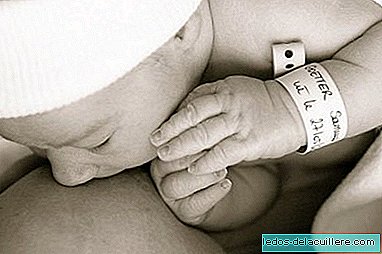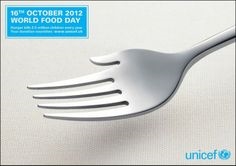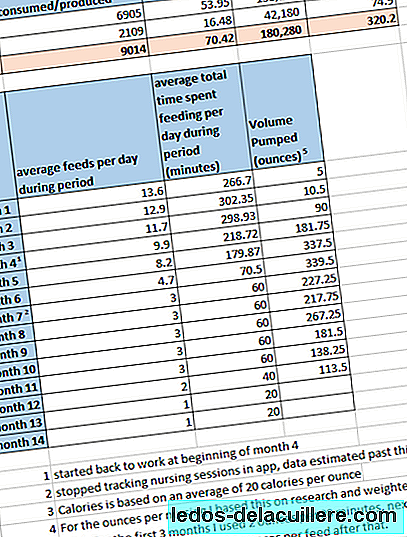We are very used to hearing about pregnancies and births, to read about them, from the mouths of women who go to hospitals to give birth. Some happy, others not so much, some would repeat, others remember and even suffer and cry when they evoke those minutes, those hours, when they made them feel incapable and tiny. What if I told you that you have the possibility to read about all this, but from the other side?
A few days ago I finished reading "The society that emptied wombs" and at a time when everything I read seemed repetitive to me, it seemed like a touch of fresh air and a great opportunity to know, finally, how a maternity plant works, what happens in a delivery room and what are the discussions, confrontations, joys and sorrows that occur between the professionals who work there and the mothers who arrive with the intention of giving birth safely.
A different novel
Written by Irene Garzón, a midwife for 13 years who has worked in the United Kingdom, Spain and Bangladesh, comes to gather all the advice and all the information that a woman needs to be able to make her own decisions regarding her pregnancy and childbirth but not as we are used to , not like a book "Everything you need to know about your pregnancy and your delivery", but within the experiences of several pregnant women, several midwives and several gynecologists who interact during the novel.
I have met in this novel incredible midwives, very respectful, brave and firm in their decisions and others less involved, with less vocation and a more paternalistic attitude. I have met "gines" equally respectful, affectionate and who are clear that decisions must always be made by women and other more protagonists, less recycled, disrespectful and interventionist. I have met pregnant women with different doubts, different concerns and individual desires that do not have all of them, and I have read them all to present their arguments, the reasons for what they do, the reasons, and everything that can happen when several people With different roles they revolve around childbirth.
The power of dialogue
If you are looking for a book that tells you about a hospital, that describes the place where everything happens, the scenarios, the procedures, a book in which the characters are defined by the author, this is not your book, because you will not find anything of that. Irene gets to the point because she is clear about the message she wants to get to women and he does it thanks to the dialogue, which is continuous. And although at first you may feel strange, to see that all you read are dialogues, then you appreciate it because it is a feature that brings freshness and dynamism.
Come on, you just do not care if one is blonde, brunette, if she has children, if she is happy or if she arrives worried at work because at home she has suffered a mishap. What interests you is what happens when a woman comes to give birth and what happens according to who is on duty that day, and as everything is explained through dialogue, you feel that you are there, in the parlor, looking out in a little window watching how everything happens while you cover your mouth with one hand and shake the other saying "my mother, what I am seeing."
A book for future mothers and professionals who help give birth
The book has, as I say, the intention of informing women of what can happen in a hospital and what they have to demand, that is, of what would actually have to happen in childbirth. Are we talking about a sick woman who is going to be treated? No, we know not. We always talk about healthy women who are going to give birth to a hospital for own will, with the intention that, if something goes wrong, it can be attended by an expert. This means that the protagonists must be the mother and the baby and that the professionals must remain vigilant in case their intervention is required.
And above all this, above a low-risk birth and a delivery in which you have to intervene because something is wrong is the right of women to be treated with respect, to be informed at all times and to be asked to make the decisions of everything. Of everything.
That is why it is a book for future mothers and that is why it is also a book for professionals who attend births, because I have read it as a father and as a nurse and, although I do not attend births, I do care for mothers and their babies and I have enjoyed meeting different professionals described in the book. Fictional characters, but so real that you could almost touch them with your fingers.
Why this title, why "The society that emptied wombs"?
It is a controversial title, very controversial, but as you read you understand why it is titled so. Giving birth, being born, are two very important vital moments in the life of a woman and in the life of a baby. She stops, he is born. It is something that happens relatively quickly if we compare it to how long life is, but of a brutal emotional charge. He how the mother lives it and how the baby lives it will greatly affect them throughout their livesAnd that is why Irene places special emphasis on showing the reader how important it is for women to take charge of their pregnancies and their maternity wards and that professionals do not compete for prominence. In other words, be clear that the first thing is the woman and her circumstances and that they are there to help, not to annoy.
That the act of giving birth becomes a moment in which the woman feels understood, accompanied, heard, supported and never, never leaves with the feeling that she has been treated badly, like a girl, who they have not denied it or that everything would have ended differently if another professional had worked that day. No, because then it all comes down to get the baby from inside, empty your uterus.
In the words of Irene Garzón
I wanted her to also explain the reason for the title and how she explains it better than me, and she is also the author, I leave you here with her words:
The reason I have put that title to the novel is to give a wake up call. I intend to remove consciences, put my finger on the sore ... The big changes are made by the group society and for that they have to be informed, know that they have options and what they are. The model of care for women during their maternity in Spain needs a major renovation, where women are the undisputed protagonists of the moment and who make the relevant decisions to their body and their child. There are many countries where this is the case (United Kingdom, Sweden, Denmark, Holland, Canada, New Zealand ...), the obstetric results are even better than ours and the user satisfaction rate is much higher than here.
The investigations and studies of this century are forceful on this subject: in Spain there are too many caesarean sections, inductions, episiotomies, births in lithotomy (posture in which the woman is lying on her back with her feet up), there are too many epidurals, they use too many medications during childbirth and there are too many separations of mothers and their babies for reasons that do not require it (a baby can be with his mother and receive the treatment he needs in that place, without needing to be admitted to another unit).
This novel is intended for both health users and pregnancy professionals to reflect on current practices, many of them obsolete and without the support of scientific evidence, so that together we make the relevant changes in the current way of being born so as not to be remembered for generations future as the society that emptied wombs.
How to get it
The book is now in campaign to raise funds in IndieGogo, where you can contribute to acquire it in pdf format, in ebook or printed format, with a price ranging from € 2 of the pdf to € 20 of the printed book (then there are the options added with gifts and even dinner with her).












